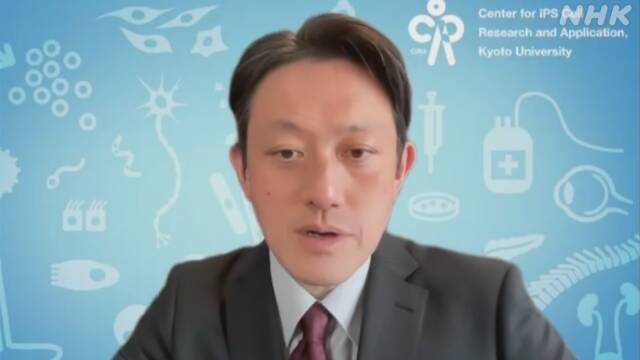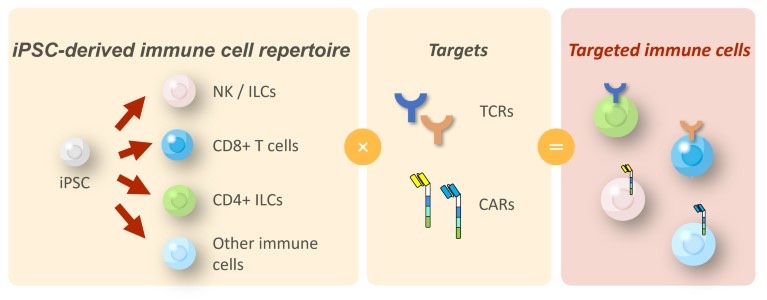

免疫細胞:“用iPS細胞製造”成功!
-使用iPS創造癌症免疫療法和免疫細胞-
京都大學:
-由iPS細胞產生的免疫細胞-
關於“用於癌症免疫治療的免疫細胞”
成功“使用iPS細胞人工增強癌症攻擊力”。
成功進行了從 iPS 細胞創建免疫細胞的實驗。
京都大學等研究小組作了介紹。
患者成本低:
通過從 iPS 細胞高效生產,
它可以以低成本提供給許多患者。
京都大學
iPS細胞研究所
新金子教授
– 京都大學 iPS 細胞研究與應用中心金子新教授領導的研究小組 –
我們召開了網上新聞發布會予以公佈。
《CAR-T細胞療法》:
CAR-T細胞療法,血癌患者的免疫療法之一
一旦患者的免疫細胞被取出體外,
融入增強癌症攻擊力的基因後,返回體內攻擊癌症。
從 iPS 生成免疫細胞:
該小組從 iPS 細胞而不是患者細胞中創造了免疫細胞。
經過人工強化後,將其施用於植入癌症的小鼠。
因此,
在治療小鼠中,
抑制癌症生長的效果已經得到證實。
NHK | 醫療/健康
https://www3.nhk.or.jp/news/html/20221213/k10013920961000.html
京都大學:生產抑制實體瘤的細胞
-在小鼠中使用iPS細胞-
iPS細胞研究所:
京都大學iPS細胞研究所的一個研究小組做了報告。
使用 iPS 細胞,我們創造了“抑制小鼠實體瘤生長的淋巴細胞和 T 細胞”。
免疫療法有望應用於比血癌更難治療的實體癌的治療。
這張紙:
12月13日,
發表於Nature生物醫學工程電子版。
研究團隊:
“具有激活攻擊癌症功能的人工蛋白質的 T 細胞”
由 iPS 細胞產生。
為了表達與正常T細胞相同的作用,
除了去除乾擾攻擊能力的基因外,
引入了促進攻擊功能激活的基因。
京都大學(時事出版社)- 雅虎新聞
https://news.yahoo.co.jp/articles/33d4ba1a928823a0fda37967f7d8c4b8e6d283c5
Cellules immunitaires : Réussir le “faire avec des cellules iPS” !
-Utiliser iPS pour créer une immunothérapie contre le cancer et des cellules immunitaires-
Université de Kyôto :
-Cellules immunitaires générées à partir de cellules iPS-
À propos des “cellules immunitaires utilisées dans l’immunothérapie du cancer”
A réussi à “améliorer artificiellement la puissance d’attaque du cancer à l’aide de cellules iPS”.
A réussi une expérience pour créer des cellules immunitaires à partir de cellules iPS.
Des groupes de recherche tels que l’Université de Kyoto ont fait une présentation.
Faible coût pour les patients :
En produisant efficacement à partir de cellules iPS,
Il peut être fourni à de nombreux patients à un faible coût.
Université de Kyoto
Institut de recherche sur les cellules iPS
Nouveau Professeur Kaneko
– Un groupe de recherche dirigé par le Professeur Arata Kaneko du Center for iPS Cell Research and Application, Kyoto University –
Nous avons tenu une conférence de presse en ligne pour l’annoncer.
“Thérapie cellulaire CAR-T”:
La thérapie cellulaire CAR-T, une des immunothérapies pour les patients atteints de cancer du sang
Une fois que les cellules immunitaires du patient sont retirées du corps,
Après avoir incorporé un gène qui améliore la puissance d’attaque du cancer, il est renvoyé dans le corps pour attaquer le cancer.
Générer des cellules immunitaires à partir d’iPS :
Le groupe a créé des cellules immunitaires à partir de cellules iPS au lieu de cellules de patients.
Après avoir été renforcé artificiellement, il a été administré à des souris implantées d’un cancer.
par conséquent,
Chez les souris traitées,
L’effet de suppression de la croissance du cancer a été confirmé.
NHK | Médical/Santé
Université de Kyoto : Production de cellules qui suppriment les tumeurs solides
-Utilisation des cellules iPS chez la souris-
Institut de recherche sur les cellules iPS :
Un groupe de recherche de l’Institut de recherche sur les cellules iPS de l’Université de Kyoto a fait une présentation.
En utilisant des cellules iPS, nous avons créé “des lymphocytes et des cellules T qui suppriment la croissance des tumeurs solides chez la souris”.
L’immunothérapie devrait être appliquée au traitement des cancers solides, plus difficiles que les cancers du sang.
Ce papier:
13 décembre,
Publié dans Nature Biomedical Engineering Electronic Edition.
L’équipe de recherche:
“Cellules T avec des protéines artificielles qui activent la fonction d’attaque du cancer”
Produit à partir de cellules iPS.
Afin d’exprimer le même effet que les lymphocytes T normaux,
En plus de supprimer les gènes qui interfèrent avec la capacité d’attaquer,
Un gène a été introduit qui favorise l’activation de la fonction d’attaque.
Université de Kyoto (Jiji Press) – Yahoo! Actualités
Immunzellen: „Machen mit iPS-Zellen“ gelungen!
-Verwendung von iPS zur Herstellung von Krebsimmuntherapien und Immunzellen-
Universität Kyoto:
-Aus iPS-Zellen generierte Immunzellen-
Über „Immunzellen in der Krebsimmuntherapie“
Erfolgreich bei der „künstlichen Steigerung der Angriffskraft von Krebs mithilfe von iPS-Zellen“.
Es gelang in einem Experiment, Immunzellen aus iPS-Zellen zu erzeugen.
Forschungsgruppen wie die Universität Kyoto hielten eine Präsentation.
Niedrige Kosten für Patienten:
Durch die effiziente Produktion aus iPS-Zellen
Es kann vielen Patienten kostengünstig zur Verfügung gestellt werden.
Universität Kyoto
iPS-Zellforschungsinstitut
Neuer Professor Kaneko
– Eine Forschungsgruppe unter der Leitung von Professor Arata Kaneko vom Center for iPS Cell Research and Application, Kyoto University –
Wir haben eine Online-Pressekonferenz abgehalten, um dies bekannt zu geben.
“CAR-T-Zelltherapie”:
CAR-T-Zelltherapie, eine der Immuntherapien für Blutkrebspatienten
Sobald die Immunzellen des Patienten aus dem Körper entfernt wurden,
Nach dem Einbau eines Gens, das die Angriffskraft von Krebs erhöht, wird es an den Körper zurückgegeben, um Krebs anzugreifen.
Immunzellen aus iPS generieren:
Die Gruppe erzeugte Immunzellen aus iPS-Zellen anstelle von Patientenzellen.
Nachdem es künstlich verstärkt worden war, wurde es Mäusen verabreicht, denen Krebs eingepflanzt worden war.
als Ergebnis,
Bei behandelten Mäusen
Die Wirkung der Unterdrückung des Krebswachstums wurde bestätigt.
NHK | Medizin/Gesundheit
Universität Kyoto: Produktion von Zellen, die solide Tumore unterdrücken
-Verwendung von iPS-Zellen in Mäusen-
iPS-Zellforschungsinstitut:
Eine Forschungsgruppe am iPS Cell Research Institute der Universität Kyoto hielt eine Präsentation.
Unter Verwendung von iPS-Zellen schufen wir „Lymphozyten und T-Zellen, die das Wachstum von soliden Tumoren in Mäusen unterdrücken“.
Es wird erwartet, dass die Immuntherapie bei der Behandlung von soliden Krebserkrankungen angewendet wird, die schwieriger sind als Blutkrebs.
Dieses Papier:
13. Dezember,
Veröffentlicht in Nature Biomedical Engineering Electronic Edition.
Forschungsgruppe:
“T-Zellen mit künstlichen Proteinen, die die Funktion aktivieren, Krebs anzugreifen”
Hergestellt aus iPS-Zellen.
Um die gleiche Wirkung wie normale T-Zellen auszudrücken,
Zusammen mit der Entfernung der Gene, die die Angriffsfähigkeit beeinträchtigen,
Ein Gen wurde eingeführt, das die Aktivierung der Angriffsfunktion fördert.
Universität Kyoto (Jiji Press) – Yahoo!-Nachrichten
Japanese researchers find efficient way to create immune cells from iPS cells
NHK WORLD-JAPAN News
Japanese researchers say
they have created artificially enhanced immune cells from iPS cells for use in immunotherapy cancer treatment.
A group led by Professor Kaneko Shin at Kyoto University’s Center for iPS cell Research and Application
made the announcement Monday at an online news conference.
In current chimeric antigen receptor-T, or CAR-T, immunotherapy for blood cancer patients, immune cells
are removed from the patients, genetically modified to boost their ability to attack cancer cells, and then returned to the patients.
The researchers say
they derived the immune cells from induced pluripotent stem cells rather than from the patients’ cells.
They artificially enhanced
the anti-cancer properties of the iPS-derived immune cells and infused them into mice implanted with cancer cells.
Kaneko’s team said
the treatment effectively prevented the cancer cells’ growth.
The researchers noted their method costs less than the current CAR-T therapy.
They said
it enables them to create immune cells efficiently from iPS cells at a lower cost that can then be used for many patients.
Kaneko said
new immunotherapies can be developed by combining his method with existing therapies, such as those using anti-cancer drugs.
https://www3.nhk.or.jp/nhkworld/en/news/20221213_07/
Leading the next wave of cancer
immune-cell therapies via allogeneic iPS-Ts Cancer immune-cell therapies are increasing in prominence as breakthrough treatments.
Since 2017,
several chimeric antigen receptor (CAR) T-cell therapies have been approved and have demonstrated excellent therapeutic efficacy in haematologic malignancies.
All of the currently approved CAR T-cell therapies are patient-derived,
and they face two major challenges: variability in the quality and quantity of produced cells; and insufficient efficacy due to cell exhaustion.
The potential use of allogeneic induced pluripotent stem cell (iPSC)-derived T cells (iPS-Ts)
is therefore attracting attention for the stable production and rejuvenation of manufactured immune cells.
Founded in 2015,
Thyas is a Kyoto University spinoff whose research and development
is focused on the clinical application of iPSC-derived immune cells, based on the research advances made by Shin Kaneko at the Centre for iPS Cell Research and Application (CiRA) in Japan.
In 2013, Kaneko — the founder of Thyas —
was the first scientist to accomplish T-cell differentiation from human iPSCs, and to demonstrate in vitro and in vivo efficacy.
Thyas is pioneering immune-cell therapies using iPSCs as an allogeneic source for the treatment of oncological and non-oncological clinical indications.
Its platform technologies
enable Thyas to consistently produce energized immune cells, especially cluster of differentiation 8 (CD8)-α and CD8-β T cells, for clinical studies (Fig. 1).